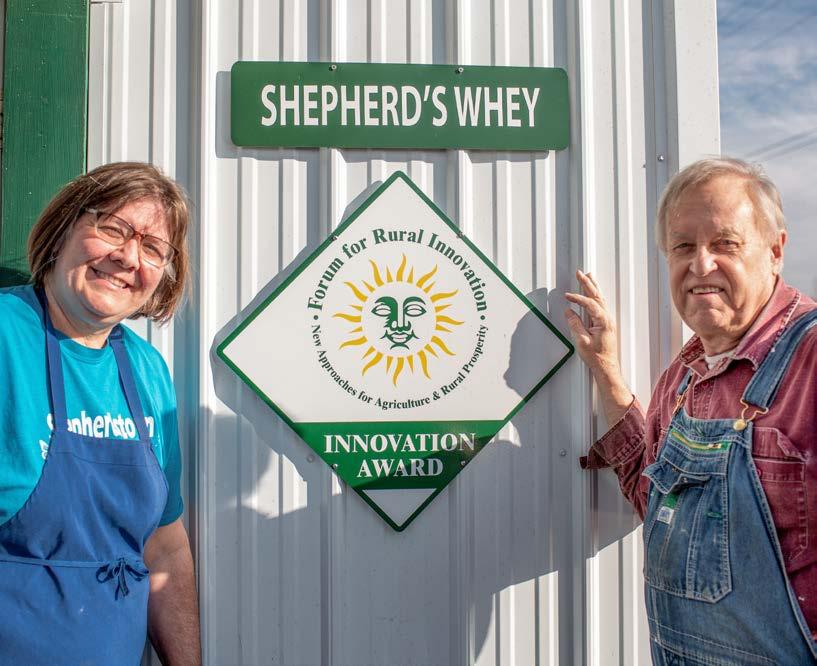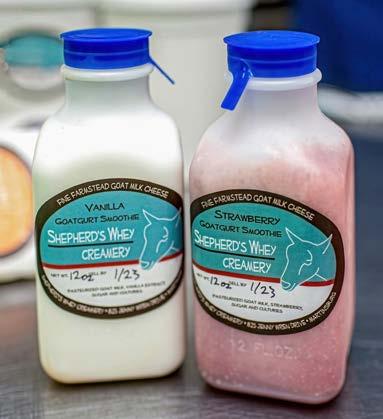
6 minute read
Support Systems are Vital Within Agriculture
Support Systems are Vital Within Agriculture
Story and photos by Andrea Haines
Advertisement
Heavy clouds of steam swirl from atop of a warm coffee cup, a man stands in a barn gazing out into the lot where his animals are happily munching on hay; he sips from the cup adorned with words from Proverbs 17:17, “A friend loves at all times”. This is a scene familiar to many producers — whether it’s the quiet moments of a morning, long hours atop a tractor seat, or sitting in front of a pile of paperwork. Oftentimes, we as providers revel in the solitude. It can be peaceful and uplifting, that oneon-one time with animals or tending the earth, however, stressors and demanding times can allow pressure to creep inside, allowing fear and doubt to overtake one’s self.
“It’s important to have another [person],” according to Dr. James “Toby” Behrmann. “We need another, who invests in us.” Dr. Behrmann has a view from both sides of the fence; he has a PhD in Clinical Psychology and is licensed as a clinical psychologist in Maryland, Virginia, and West Virginia.
He and his wife Suzanne also own and operate Shepherd’s Whey Creamery, a Grade A goats’ milk processing facility in Martinsburg, West Virginia. “I remain in full-time practice, including a part-time position as Chief of Psychology at a State of Maryland medium term residential treatment center for Dual Diagnosis Intellectually Disabled individuals,” he explains. “I work with children, adults, and families in private practice outpatient psychotherapy, with a subspecialty in family law issues such as parenting, custody, and adoption concerns.”
Dr. Behrmann’s involvement with farming is in the crop/hay area, growing mixed grass and legume hay, and repairing buildings and machinery. “I can dovetail this somewhat time-flexible dimension of our agriculture life with my private practice hours,” he shares. Suzanne has a master’s degree in physical therapy and retains a license, but for her, there was a complete shift to full-time farmer and business owner after the creamery was built. He says, “She has primary responsibility of the herd management, cheese making, and marketing.

“We formally started farming operations in 2006 on our small 2.75 acre property that remained of what had been a horse-plowed 10 acre working farm.” He chuckles, “I would describe our farming endeavor as a 4-H project starting with just two dairy goats and homemade goat cheese of various sorts that got completely out of control. You know, where one small thing leads to another logical, relatively small ‘needed’ next thing, and finally you step back and ask, ‘Whoa, wait a minute, what are we doing?’”
The Behrmanns were fortunate enough to live in an area of historically small farms that had many active and retired farmers who took interest in them and their questions. “To make a small farm financially viable, we had to have a value-added product and/or niche market, as we would not be competitive with large-scale agriculture,” he shares. “The farm’s close proximity to a large population with discretionary income was another advantage in lowered transportation delivery time, and costs to potential target market. In a swap of services for land use from a neighbor, we had leased 20 to 30 acres of older fields we could work up for hay.” Finally, access to saved start-up funds, plus a construction loan for the creamery thanks to Farm Credit, Shepherd’s Whey Creamery was born in 2012.

“Farm Credit was the critical outside help we could not have done without in starting our farm-creamery venture,” he shares. “Farmers are, and need to be, immanently practical. They tend to view relationships with people the same as they do their own work. In moving forward in life, words only go so far; without action, nothing will actually be accomplished. Thus, it is counter-intuitive (to them) that it might be useful to go somewhere just words (talking) are used about one’s problems (counseling). This perception, along with revealing what is usually supposed to be private, can appear to be shameful, and a waste of time and money.”
Dr. Behrmann continues, “But when we are repeatedly unable to do what we know makes sense, we need interpersonal help. We can forget that most of what we’ve absorbed has come from personal instruction and support. Some of us from a parent who told us and showed us the way. Some of us from the extra time and investment of a teacher or a club leader. When we each alone are not enough despite our reading, or inherent experience, our resolve is we need ‘another.’”
He continues, “This is not a flaw. It is designed into us from the get-go. Whenever the task is overwhelming us, when we can’t get a handle on it, we need another. All our life, from infant to adulthood, whenever we are repetitively unable, we need another who invests in us. The type of help we need is in specialized information and targeted relational support. Finding and receiving that genuine investment and expertise toward us is itself the sufficient ‘action’ to accompany words.”

According to Farm Credit loan officer Michelle Trumpower, “The Behrmanns are very conscientious borrowers and don’t make decisions until they have had the opportunity to think about the subject, which makes them such successful business entrepreneurs. They have been with Farm Credit for many years,” she shares. “After evaluating another bank, they reached out to us for purchase on a neighboring property. A positive experience coupled with some of us being ‘farmers’ ourselves, they decided to remain with Farm Credit.”
Aside from Farm Credit, there was no other lender that would consider a smaller loan, even for a credit-worthy small farmer. “They maintained a supportive accountability, not a critical accountability, throughout the project,” Dr. Behrmann shares. “Now, the new loan based on our creamery’s success to date not only matched other lender interest rates, but also saved us literally thousands in funding costs. Of the various lenders we explored, no one either cared about or understood our overall goals, our big picture, like Farm Credit.”
Michelle explains, “They are always looking to become educated about new and better processing methods, and want to incorporate upgrades to the creamery.” Suzanne comments, “We offer our products at farmers’ markets in West Virginia, Virginia, and Washington D.C., high-end restaurants, specialty retail stores, and on-farm.” The farm consists of 30 French Alpine dairy goats, most deriving from Munchin Hill genetics in Pennsylvania. As the cheese-making expanded, they shifted to purchasing two-thirds of the milk from Liberty View Creamery, a goat dairy in Littlestown, Pennsylvania. “This helps us meet the demands of our customers year-round,” shares Suzanne.
“Farm Credit understood us and how this next project dovetailed with what we were already doing and where we wanted to head, and why,” says Dr. Behrmann. “Farm Credit doesn’t just say ‘partner’ to us, they are ‘partner’ with us.”
To read the full version of this story, visit mafc.com/blog/support.
You can find Shepherd’s Whey Creamery online at shepherdswheycreamery.com Facebook: @ShepherdsWheyCreamery Instagram: @shepherdswhey





